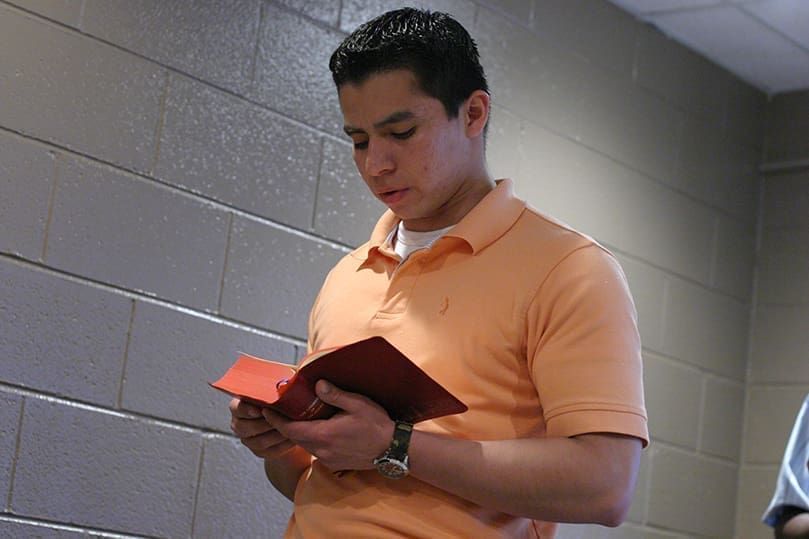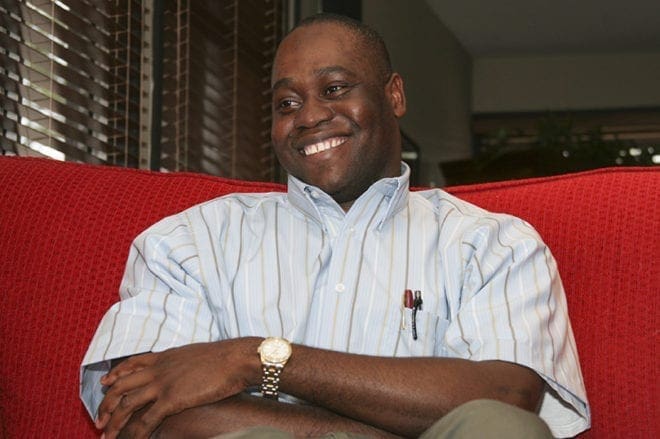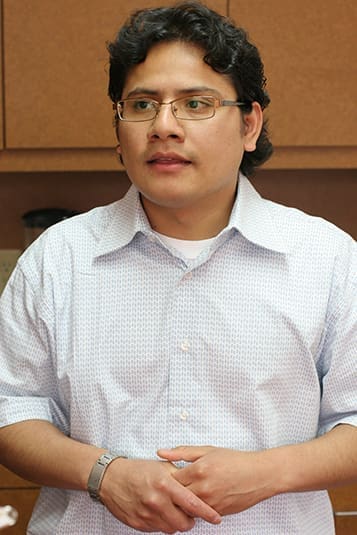 Photo By Michael Alexander
Photo By Michael AlexanderAtlanta
Borromeo House Eases Entry Into American Culture
By ANDREW NELSON, Staff Writer | Published March 19, 2009
The sweet smell of incense hangs in the air in the small chapel as the three men gather for evening prayer. One by one, each of the three stands and prays in halting English the Liturgy of the Hours.
It is one of the daily routines for these 20-somethings.
“It is a very good place for our spiritual life. That makes the home very special,” said Junot Nelvy.
Nelvy, 27, a Haitian, is one of the three foreign students living at St. Charles Borromeo House of Priestly Formation, a building on the campus of Blessed Sacrament Church in south Fulton County, west of the Hartsfield-Jackson Atlanta International Airport.
Its roots go back 10 years to what was then called Nazareth House, where seminarians and others considering life as a priest shared daily life.
The house today serves largely as a home away from home for foreign-born men interested in serving as priests for the Archdiocese of Atlanta. Here they live while they attend English classes at Georgia State University before entering a U.S. seminary. Current seminarians also gather weekly during the summer here to get reacquainted. The house is run by the archdiocesan Vocations Department.
A pool table and a large stone fireplace fill the spacious living room in the comfortable house. Stuffed sofas and chairs sit in front of the TV. The men study homework and e-mail family back home in the computer room. A 12-seat chapel is used for daily Mass.

At 27 Junot Nelvy is the senior member of the trio of seminarians who moved into the St. Charles Borromeo House last August. Photo By Michael Alexander
An icon of St. Martin de Porres is near Rafael Esquen’s bed. The saint is from Esquen’s native Peru. He tacked on the wall a handwritten paper to translate his Spanish to English: donde (where), que/cual (what), quien (who).
Esquen, who is 26, is the youngest of two brothers and one sister.
“I need my family near,” he said, describing how it can be lonely in an unfamiliar culture. But his purpose here is important, said Esquen, who studied for eight years in a religious order.
Nelvy is the only one with a driver’s license. He is gaining confidence behind the wheel by practicing in the parking lot before driving on the streets, he said. As a student at a seminary in Haiti, Nelvy said he would travel to Atlanta to visit his brother, who then lived in Marietta.
Around Christmas, he and Esquen stayed at parishes to get a taste of how Americans celebrate the season.
“I think it’s a very busy activity for the priest,” he said, about seeing the hubbub at St. Brigid Church, Johns Creek.
During the week, two Sisters of the Blessed Sacrament work around the house and prepare meals. But Sunday is community night. Everyone helps out in the kitchen.
Feiser Elliott Munoz, 24, laughed out loud at the idea of him cooking for everyone else. “In my country, men never cook,” he joked, adding, “I cook on Saturday because I need to eat. I never cook for the community.”
Munoz, who was studying to be a military chaplain in his native Colombia before moving here, said the experience at the Borromeo House is challenging. Learning another language and culture is not easy, he said.
The program introduces the men to American culture as they juggle university classes. Everyone arrived in August. They take field trips together, like seeing the Atlanta Zoo. Local families from the men’s native countries adopt them and expose them to the American way of life. The trio work around the house, painting a room to freshen it up.

Twenty-six year Peruvian native Rafael Esquen studies second level English at Georgia State University, Atlanta. Photo By Michael Alexander
The house isn’t an introduction to the life of a priest but to the idea of serving as priests in America. They have already attended seminary in their own countries. They attend English language courses for more than a year and then they may apply for a seminary here.
Mario Lopez, a native of Colombia, is finishing his fourth year of theology at Mount St. Mary’s Seminary in Maryland and is to be ordained a deacon in May. He lived in the house in 2004 for a year and a half.
Lopez said the cultural immersion corrected mistaken views of America he once held. In the past he believed American Catholics had a superficial faith surrounded by a consumerist society.
But within months of living here and seeing the multicultural expressions of faith he came to a truer picture of the church, he said.
“I saw commitment, solidarity and many Christian values which are a proof of their deep faith and love to the Lord,” he wrote in an e-mail.
Lopez said living at the house was an excellent introduction to the archdiocese.
“I realize that there is more that unites us as a human family than divides us and that although language was a barrier, we help each other to communicate not only with words but also with the living word of God that resides in every heart,” he wrote.
The men are either recruited by the Vocations Department or contacted Father Luke Ballman, vocations director, about the opportunity to minister here. Father Ballman travels to South America and Mexico to meet with prospective seminarians during the year.
Father Ballman, the house rector, said during their time here the men are exposed to an unfamiliar American culture, from learning to drive to understanding how Americans value showing up on time for appointments. Father Theodore Book is the vice rector.
“All of these things Americans take for granted, but for people who did not grow up in the United States, it is an adjustment to learn these things,” said Father Ballman in an e-mail.